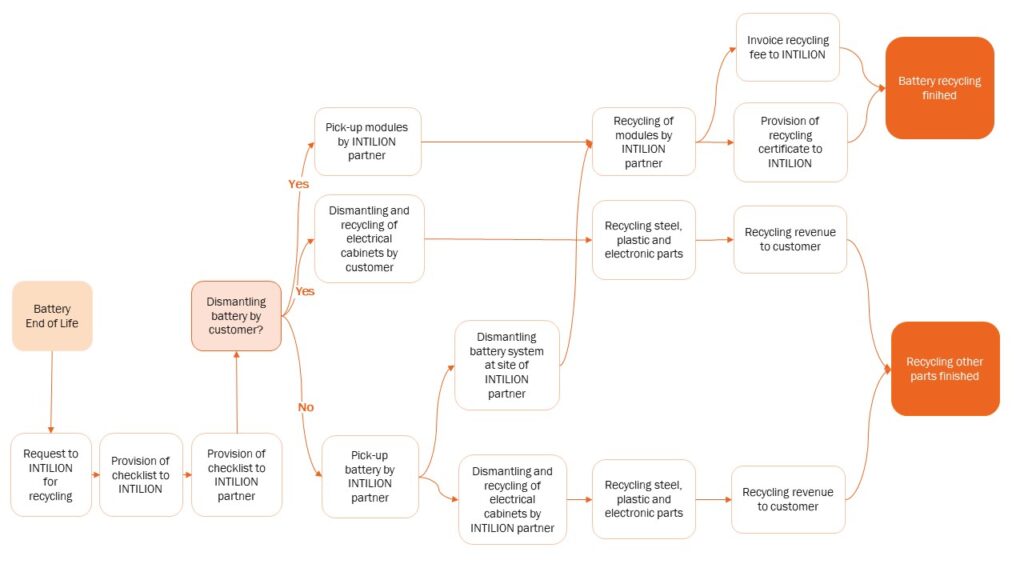Battery recycling: everything about energy storage and lithium-ion recycling
Battery recycling is an increasingly important topic. With the growing popularity of energy storage systems and other devices that use lithium-ion batteries, it is crucial to understand how these batteries can be recycled. In this article, you will learn everything about energy storage and the recycling of lithium-ion batteries.

- 7 Min.
What is battery recycling, and why is it important?
Battery recycling refers to the process of recovering and reprocessing batteries, particularly lithium-ion batteries. Depending on the type of battery, valuable materials such as lithium, cobalt, and nickel are extracted, reducing the environmental impact of mining new resources and ensuring the availability of these materials. At the same time, it helps safely remove and dispose of harmful chemicals like mercury, lead, and cadmium, which can be found in some batteries. This prevents toxic substances from entering the environment.
Battery recycling is a complex process that requires specialized facilities and involves several steps, including collection, transportation, discharging, dismantling, and material separation. Through this recycling concept, valuable resources are conserved, and environmental protection is enhanced.
Battery recycling is crucial for several reasons. It reduces environmental impact by preventing the release of harmful substances and minimizing the need for new raw material extraction. Additionally, it offers economic benefits, as recycled materials can be reused, leading to cost savings and new business opportunities. Overall, battery recycling supports the shift towards a more sustainable and eco-friendly society.
Types of batteries and their components
There are various types of batteries used in different devices and applications. The most common types of batteries include:
Lithium-ion batteries: These batteries are widely used in many electronic devices, such as mobile phones, laptops, and electric vehicles. We also use lithium-ion batteries for our energy storage systems. They are known for their high energy density and long lifespan.
Lead-acid batteries: Commonly used in vehicles and as backup power sources in emergencies, these batteries contain lead plates and sulfuric acid.
Nickel-metal hydride batteries: These are frequently found in portable electronics, such as cameras and remote controls. They contain nickel oxyhydroxide and metal hydride.
Nickel-cadmium batteries: Previously common in portable electronics, these batteries are being phased out due to their harmful environmental effects. They contain nickel oxyhydroxide and cadmium.
Each type of battery has different components and requires specific recycling processes. When recycling batteries, it’s important to account for these differences and apply the correct procedures to ensure efficient and environmentally friendly reuse.

The lifecycle of lithium-ion batteries
Lithium-ion batteries are one of the most commonly used types of batteries, especially in our energy storage systems, as well as in electric vehicles, power tools, e-bikes, and electronic devices. The lifecycle of a lithium-ion battery involves several phases, from production to usage and recycling. Here are the key phases in the lifecycle of a lithium-ion battery: Production: In this phase, the various components of a lithium-ion battery, such as electrodes, separators, and electrolytes, are manufactured and assembled into a functional battery. This process requires raw materials like lithium, and in some cases, cobalt and nickel. Usage: The battery is used in our energy storage systems, providing the necessary power. During use, the battery gradually loses its capacity and needs to be recharged regularly. Disposal/recycling: At the end of its life, the battery is always recycled. The battery is dismantled, discharged, and valuable materials such as lithium, nickel, or cobalt are extracted through various processes, allowing them to be reused. Recycling improves the sustainability of lithium-ion batteries by recovering and reusing valuable materials. This helps conserve resources and reduce environmental impacts.Problems and challenges in battery recycling
Although battery recycling offers many benefits, there are several issues and challenges that can arise during the process. Here are some of the key problems and challenges in battery recycling:
Safety: Batteries can contain hazardous chemicals that, if mishandled or improperly disposed of, can cause injuries or environmental damage. It is crucial for recycling facilities to establish and follow strict safety measures to prevent accidents and protect the health of workers and the environment.
Collection and transportation: The collection and transportation of batteries present logistical challenges. Batteries must be properly collected and transported to ensure they are not damaged and do not pose risks to people or the environment.
Dismantling and separation: Dismantling and separating batteries require specific knowledge and specialized facilities. Since batteries are charged, handling is only permitted by specially trained professionals. Additionally, batteries contain various components and materials that require specific handling to enable their reuse.
Scalability: With the increasing use of batteries in various applications, it is important for battery recycling to be scalable. Sufficient recycling capacity is needed to meet the growing demand for battery recycling.
Addressing these problems and challenges requires close collaboration between governments, battery companies, and recycling facilities. By investing in research and development, new technologies can be developed to further improve and streamline the battery recycling process.
If you are planning your energy storage project, please contact us.
Benefits of lithium-ion recycling
Recycling lithium-ion batteries offers various ecological and economic benefits. Here are some of the key advantages of lithium-ion recycling:
Resource conservation: Lithium, cobalt, and nickel are valuable materials found in lithium-ion batteries. Recycling allows these materials to be recovered and reused instead of extracting new raw materials, sometimes at great energy expense. This helps conserve resources and decreases the demand for mining activities.
Reduction of environmental impact: Lithium-ion batteries contain harmful chemicals such as ethyl carbonates, diethyl carbonates, lithium, cobalt, and nickel, which can harm the environment if not disposed of properly. Recycling ensures that these hazardous substances are safely removed and disposed of, protecting the environment.
Promotion of a sustainable society: Lithium-ion recycling is an important step toward fostering a more sustainable and environmentally friendly society. By recycling our batteries, we can help conserve natural resources and reduce environmental pollution.
Lithium-ion recycling has the potential to reduce the environmental impact of batteries while conserving valuable resources. It’s crucial to support lithium-ion battery recycling and ensure proper disposal to fully benefit from these advantages.
The battery recycling process at INTILION
The battery recycling process for energy storage systems at INTILION involves several steps to collect, dismantle, and recover valuable materials from batteries. Here’s an overview of the recycling process:
- Request dismantling appointment (approximately six months before the end of operational life).
- We develop a customized plan for dismantling and properly disposing of the system. This includes dismantling individual components and arranging transportation to a certified disposal service provider.
- Optional additional services: Removal of foundations, decommissioning of additional system infrastructure, and even land restoration in accordance with previous building permit requirements.
- Afterward, we provide all required disposal documentation in compliance with the Battery Act.
Is the energy storage system from another provider? We also take care of the complete and professional disposal in such cases.

The battery recycling process at INTILION
The battery recycling process requires specialized facilities and expertise. It is crucial that the process is carried out efficiently and in an environmentally friendly manner to achieve the best possible results.
Legal regulations and guidelines for battery recycling
Battery recycling is governed by various legal regulations and guidelines to ensure the safety of people and the environment. Here are some of the key regulations and guidelines related to battery recycling:
European Battery Directive (EU-BattVO 2023/1542): This directive sets minimum requirements for the marketing and disposal of batteries. It also includes provisions for the collection, recycling, and reuse of batteries.
Hazardous goods regulations: Batteries are often classified as hazardous goods and are subject to specific regulations for transportation and storage. These rules ensure that batteries are handled safely and do not pose risks to people or the environment.
Waste laws and regulations: Battery recycling is subject to waste management laws in various countries. These laws regulate the disposal of batteries and define who is responsible for the collection, transportation, and recycling of batteries.
It is essential for companies and organizations involved in battery recycling to comply with applicable legal regulations and guidelines to ensure that the recycling process is conducted safely and in an environmentally responsible way.
Companies and organizations involved in battery recycling
Battery recycling is a complex process that requires collaboration between various companies and organizations. Here are some of the key players involved in battery recycling:
Recycling companies: Specialized recycling companies focus on battery recycling. These companies have the necessary facilities and expertise to safely dismantle batteries and recover valuable materials.
Battery manufacturers: Battery manufacturers play an important role in battery recycling. They can take steps to ensure that their batteries are easy to recycle and that recycling programs are available for their products.
Governments and authorities: Governments and regulatory bodies play a vital role in setting regulations and guidelines for battery recycling. They can initiate policies to promote battery recycling and provide financial support for recycling programs.
Collaboration between these different stakeholders is crucial for implementing battery recycling efficiently and successfully.
Conclusion and outlook on the future of battery recycling
Battery recycling plays a vital role in reducing the environmental impact of batteries and conserving resources. By recycling batteries, valuable materials can be recovered and reused instead of simply discarded. This contributes to the preservation of natural resources and decreases the need for mining activities.
While battery recycling offers many benefits, there are also various challenges and issues that need to be addressed. Safety, collection, and transportation of batteries are important aspects of the recycling process that require careful management.
Legal regulations and guidelines for battery recycling also play a crucial role. It is essential for companies and organizations to comply with applicable regulations to ensure that the recycling process is conducted safely and in an environmentally friendly manner.
The future of battery recycling looks promising. With the increasing use of batteries in various applications, the demand for battery recycling is expected to rise, and there is a growing number of battery recycling companies. Investments in research and development can lead to new, optimized technologies that improve and enhance the efficiency of the recycling process.
Overall, battery recycling is an important step toward promoting a sustainable and eco-friendly society. By recycling our batteries, we can help conserve natural resources, reduce environmental impact, and recover valuable materials. It is our responsibility to support battery recycling and ensure that we dispose of our batteries properly.
Do you have further questions?
Then book a free online consultation with one of our experts for your energy storage system.

